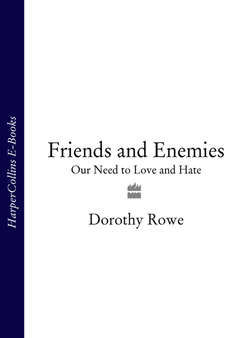Читать книгу Friends and Enemies: Our Need to Love and Hate - Paula Nicolson, Dorothy Rowe, Dorothy Rowe - Страница 5
PREFACE
ОглавлениеFriendship is our greatest invention. No technological construction, no work of art, can compare with the art and skill of friendship which takes us out of the lonely world of our own individual perceptions and puts us close to another person, linked by feelings of love, trust, tolerance, sympathy, generosity, kindness, joy and humour. We can set ourselves the greatest tasks and achieve them, we can become rich, famous and powerful, but all our achievements will be mere dust and ashes if we are friendless. We can have lovers, we can have family, but all these relationships will bring us nothing but misery if they are not imbued with the qualities of friendship.
Friendship has always been of supreme importance in our lives, but today it has taken on a new urgency. Changes in society and in our expectations mean that many people turn to friends to supply what in past years they would have looked for in marriage or family. A businesswoman in South Africa said to me, ‘If I had to choose between my husband and my friend I’d choose my friend. She and I talk every day. We tell each other everything. My husband is all right, but we don’t talk.’
Moreover, while nations no longer engage in huge wars which mobilize many thousands of troops, across the globe we see conflicts which, though they involve smaller numbers of people, inflict terrible violence and suffering on everyone caught up in them. It is essential to resolve these conflicts if we are to overcome the ecological threats to our planet. Enmity is as old as friendship, yet we seem unable to understand why, when friendship is so glorious and so precious, many people choose to be enemies rather than friends. Of course a friendship has to be reciprocal, two people in tune with one another, while you can hate someone without that person hating you. It is even easier to be hated. You do not have to do anything. You just have to exist. You are sure to have some characteristic which someone hates – the colour of your skin, the place you were born, your sexuality, your religious beliefs.
We seem unable to understand how to turn enmity into friendship. The existence of enmity seems to be taken for granted. We deplore revenge and praise forgiveness but we rarely ask, ‘How do we learn the art and skill of friendship?’ or ‘Why is friendship so hard to achieve?’ or ‘Why, when we have been wounded by an enemy, does revenge become an imperative?’ or ‘Can we live without enemies?’ or ‘How does reconciliation become possible?’ or ‘Can we choose to forgive, and, if we can, why don’t we?’
These and other questions about friendship and enmity I examined in discussions with friends, colleagues and workshop participants, and with people I met on my travels in Serbia, Lebanon, Northern Ireland, South Africa, Vietnam and Australia. Such discussions covered both intimate personal experiences and questions arising from national, racial, political, social and religious issues. As I wrote this book conflicts raged around me. NATO bombed Serbia; the United Nations fumbled their task of protecting the people of East Timor; Russia invaded Chechnya while the West did no more than chide. The Unionists in Northern Ireland continued in their refusal to speak to members of Sinn Fein until Senator George Mitchell demonstrated the skills needed to turn enmity into friendship, but unfortunately he could not reach everyone in Northern Ireland who needed to change. For many people their enemies are more precious than their friends.
Just as I finished writing this book a dear young friend, Hilary Surman, someone I had known for twenty years, died within a few weeks of being diagnosed with cancer. Hilary and I were members of a small group of long-time friends. I find that the pain of losing her is edged around by the sweetness of the closeness of friends.
My thanks to all my friends and to all the people who talked to me about the importance of friendship and the dangers of enmity.
Dorothy Rowe
London, November 1999
